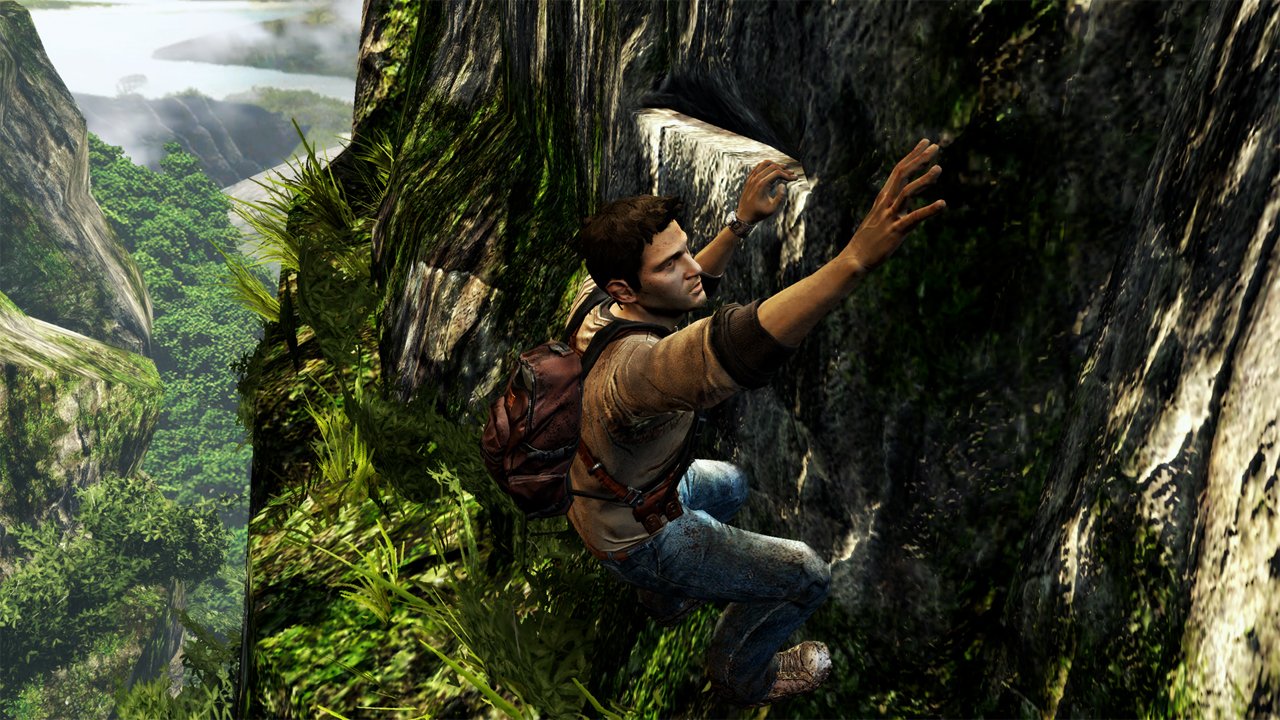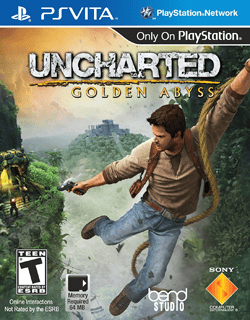Sony’s efforts in portable gaming have focused almost entirely on translating console-level titles to handheld systems. This approach, for better or worse, continues to be the apparent drive behind the newly released PlayStation Vita’s line-up of launch games. Each one, it seems, has to try its hardest to impress an audience with gameplay that apes the more robust hardware and control options of, say, the PlayStation 3 or Xbox 360. And because Uncharted is one of the PS3’s best loved exclusive titles, the series’ newly released Vita iteration, Uncharted: Golden Abyss, is saddled with the burden of proving the validity of a console-style experience on a handheld.
The developers at Bend Studio have done an admirable job with the tools at their disposal, creating a title that demonstrates a lot of the Vita’s potential. Golden Abyss looks and sounds fantastic and (especially considering that it’s one of the first games to launch on the system) provides a compelling argument for Sony’s claims that the handheld is able to emulate the console experience. While Uncharted 2 and 3’s incredible action set-pieces (like gunfighting in a collapsing skyscraper or chasing down an enemy motorcade from horseback) are noticeably absent here, Abyss still presents a series of exceedingly well-rendered jungles, caves, sprawling vistas and ancient buildings that feel suitably organic and worthy of exploration. The sound is equally impressive. Golden Abyss features many of Uncharted’s trademark themes, but adds in a number of original songs to its score. Each track matches the aesthetic very well, thudding drums, shrill flutes, thundering brass and choral chants helping to drum up excitement during combat or subtly accompany ambient, environmental sounds while solving puzzles. While it doesn’t quite match the (very) high presentational standards of the console Uncharted games, the Vita iteration’s audio and visuals are still a remarkable accomplishment when regarded on their own merits.
Despite its successes, though, Golden Abyss is plagued with a number of significant issues that hold the game back. While the typical Uncharted brand of climbing-and-leaping-and-swinging platforming is great, the other half of the series formula — gunplay — is far less enjoyable. The controls feel a bit too floaty for the type of precision aiming the game’s frequent shoot-outs ask for and, while players are sure to acclimatize to this throughout the lengthy campaign, the introduction of a combat sequence is still likely to inspire more of a feeling of dread than joy — anathema to a well-rounded experience — for the entirety of the game. Some of the weapons are better designed than others. Single-shot pistols lend themselves well to the less accurate controls and the sniper rifle’s rear touchscreen zoom gimmick (more on these in a second) is one of the only guns to provide the player with a sense of real control.
The entire game is also hampered by what can only be assumed to be the result of a directive issued to Bend Studio as the developers of one of the Vita’s most anticipated first-party launch titles: plenty of gameplay instances requiring use of the system’s touchscreens and accelerometer. Some of these gimmicks work well — dragging a path across a climbable surface to make Drake automatically traverse it or tapping an icon to pick up weapons, reload or punch out an enemy — but, far more of them simply get in the way of the action. Walking across almost every log or plank causes a short, hackneyed minigame to appear, forcing players to shift their Vita back and forth to balance while melee combat and common actions like opening doors or hoisting a non-playable character require extremely repetitive touchscreen swiping.
Even when the controls do work well, many players are likely to find themselves sticking to the more direct, traditional controls (analogue sticks and face buttons) rather than the touch ones. I found myself frequently swapping between the two throughout the first few hours — and suspect that many other players will do the same. Golden Abyss reinforces the old adage, “If it ain’t broke, don’t fix it.”
And despite the relatively benign intrusion of touch/motion controls during gameplay, pacing is frequently (and more seriously) interrupted by completely unnecessary activities that give the unpleasant impression that they’ve been shoehorned into scenes that were designed without them in mind. Worse, they cause a disconnect from the rest of the game’s organic blending of gameplay and non-interactive cinematic. A cutscene will be interrupted so Drake can piece together a jigsaw puzzle (seriously!) or unlock a padlock by spinning numbers into place. After performing the task characters will resume talking as if a considerable pause in the conversation hadn’t just occurred.
This is too bad because Golden Abyss’ plot is heads and tails above the quality of many videogames. The cast of familiar and new faces is well realized and, despite a few hamfisted “character development” moments, each possesses plausible motivation and personality. While it takes longer to pick up momentum than any of the other Uncharted titles, the pseudo-historical framework of the game’s treasure hunting adventure is just as rich, providing plenty of impetus to continue progressing through the story.
Unfortunately, though, much of the dialogue falls flatter than it should. It doesn’t take long before players will begin to notice the absence of Naughty Dog’s Amy Hennig (the console Uncharted’s Writer/Creative Director) and her ability to craft natural sounding, witty exchanges that entertain as much as inform the shaping of the characters she writes. The voice actors do a commendable job of making do with what they’re provided, though, and the rapport between Nolan North as Nathan Drake and Richard McGonagle as Victor Sullivan makes the pair’s exploration sequences as enjoyable to listen to as ever.
The complete absence of multiplayer is unfortunate, considering how well the mode has been implemented to the latter of the console releases, but Golden Abyss looks to make up for this shortcoming with extra, replay-focused gameplay features. In the place of the series’ standard collection of randomly located treasures, Abyss features a number of “Mysteries” — essentially optional items and puzzles that provide additional background information on the historical figures and gods involved in the setting. The number of collectables strewn throughout the game’s many levels provides a good incentive for revisiting each chapter and plumbing its hidden recesses. These are great, but Black Market, a fairly shallow trading mechanic that utilizes the Vita’s Near functionality, is less so. While taking advantage of the portable system’s built-in features to add a layer of social play to the game may seem like a good concept, players who aren’t obsessed with achieving every one of Abyss’ trophies won’t find much reason to spend time actually using it.
Golden Abyss is not, by any means, a bad game. The only real problem is that it’s just not a great Uncharted game. Players who go into it looking for the technology-straining grandiosity of its PS3 brethren will be disappointed by the more humble scale of this iteration. Those with tempered expectations are more likely to enjoy Uncharted: Golden Abyss on its own merits as a satisfying action game with stellar production values.






